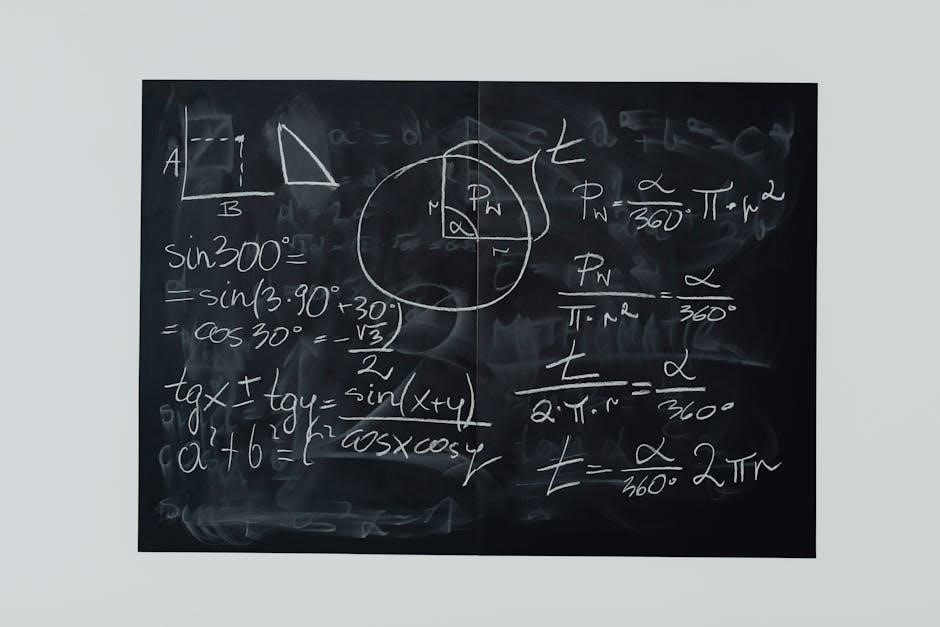Advanced Calculus PDF: A Comprehensive Guide
This guide explores Advanced Calculus PDFs, offering resources for open-source texts like Active Calculus and APEX Calculus․ It highlights textbook options such as OpenStax Calculus, covering key concepts, applications, and problem-solving techniques for advanced study․
Free and Open-Source Resources
Active Calculus Series
Textbook Options
Various textbook options are available for studying advanced calculus․ OpenStax Calculus and APEX Calculus are examples of comprehensive resources․ These books offer different approaches and styles to cater to diverse learning preferences․
OpenStax Calculus
OpenStax Calculus is a valuable resource for students seeking a comprehensive understanding of calculus concepts․ Designed for typical two- or three-semester general calculus courses, it incorporates innovative features to enhance student learning․ This book guides students through the core concepts of calculus and helps them understand how those concepts apply to their lives and the world around them․
OpenStax Calculus is available in PDF format, making it accessible to students with varying technological capabilities․ The textbook is designed to be affordable and readily available, supporting student success in mastering calculus․ Notable authors such as Gilbert Strang and Edwin Herman contribute to its content․
APEX Calculus
APEX Calculus is a free, open calculus textbook crafted by Greg Hartman from the Virginia Military Institute․ It has been utilized by institutions like the University of Lethbridge since 2015, replacing traditionally used PDF textbooks edited by Sean Fitzpatrick․ APEX Calculus provides a comprehensive approach to calculus education․
APEX Calculus is available for free download in PDF format, ensuring easy access for students․ This resource is particularly useful for those seeking an affordable yet thorough understanding of calculus principles․ Its adoption by various educational institutions highlights its credibility and effectiveness as a learning tool․ The textbook covers essential topics․
Key Concepts and Applications
Advanced Calculus delves into fundamental concepts, expanding on introductory calculus․ It explores topics such as vector analysis, infinite series, and special functions․ These sub-theories form the core of advanced calculus, enhancing problem-solving skills․ Understanding these concepts is crucial for applying calculus in various scientific and engineering fields․
The course emphasizes rigorous mathematical thinking and proof construction․ It revisits aspects with a stronger focus․ Multi-variable differential calculus is a significant area, introducing differential forms and their applications․ These concepts are essential for understanding complex systems and phenomena․ Advanced calculus provides a solid foundation for further studies․

Availability and Formats
PDF Downloads
Numerous advanced calculus resources are readily accessible as PDF downloads․ These include complete textbooks, lecture notes, and problem sets designed to support in-depth study․ Open-source options, such as Active Calculus and APEX Calculus, are frequently available in PDF format, offering cost-effective learning materials․ Many university websites and online repositories provide free PDF versions of calculus texts and supplementary materials․
Popular resources like OpenStax Calculus are also downloadable as PDFs․ Users should be aware that file sizes can vary significantly, with some comprehensive textbooks exceeding 30 MB․ Ensure your device has sufficient storage․ Check for updates, as newer versions may offer improved content or corrections․ Consider using PDF readers with annotation tools for effective studying․ Always verify the source of the PDF to ensure accuracy and completeness․
Course Prerequisites
Before embarking on advanced calculus, a solid foundation in fundamental mathematical concepts is essential․ Typically, a strong understanding of single-variable calculus is a prerequisite, encompassing topics such as limits, derivatives, integrals, and their applications․ Familiarity with algebraic manipulation, trigonometry, and analytic geometry is also expected․ Some courses may require linear algebra, providing the necessary tools for multi-variable calculus․
Furthermore, a certain level of mathematical maturity is beneficial․ This includes the ability to understand and construct mathematical proofs, think abstractly, and solve complex problems independently․ Students should be comfortable with mathematical notation and terminology․ A prerequisite course in mathematical analysis can also be beneficial․ Textbooks like OpenStax Calculus often outline specific prerequisites․ Confirming these requirements ensures readiness for the rigorous demands of advanced calculus․

Essential Topics Covered
Advanced calculus delves into a range of essential topics building upon foundational calculus principles․ Multi-variable calculus is central, exploring functions of several variables, partial derivatives, gradients, and multiple integrals․ Vector calculus introduces vector fields, line integrals, surface integrals, and theorems like Green’s, Stokes’, and the Divergence Theorem․ Real analysis provides a rigorous treatment of limits, continuity, differentiation, and integration․
Sequences and series are examined in detail, including convergence tests and power series representations․ Differential equations, both ordinary and partial, are crucial, focusing on solution techniques and applications․ Linear algebra provides the tools for working with vector spaces, matrices, and linear transformations․ Furthermore, topics like Fourier analysis, complex analysis, and numerical methods may also be introduced․ These topics equip students with a comprehensive toolkit for advanced mathematical problem-solving․

Advanced Topics
Building upon the essential topics, advanced calculus extends into more specialized and theoretical areas․ Functional analysis explores vector spaces of functions, operators, and their properties, leading to concepts like Banach and Hilbert spaces․ Differential geometry studies curves, surfaces, and manifolds using calculus and linear algebra, with applications in physics and engineering․ Measure theory provides a rigorous foundation for integration and probability, extending beyond Riemann integration․
Topology examines the properties of spaces that are preserved under continuous deformations, providing a framework for analysis on more general domains; Partial differential equations are investigated in greater depth, including advanced solution techniques and existence theorems․ Complex analysis delves into functions of complex variables, exploring topics like contour integration and conformal mappings․ These advanced topics offer a deeper understanding of mathematical structures and their applications in various scientific fields․

Problem Solving and Exercises
Mastering advanced calculus requires diligent practice through problem-solving․ Exercises range from routine applications of theorems to more challenging proofs and derivations․ Textbooks often include a variety of problems, graded by difficulty, to solidify understanding․ Working through these exercises helps develop critical thinking and analytical skills․ Problem-solving strategies include applying definitions, using theorems, and constructing counterexamples․
Collaboration with peers and seeking guidance from instructors can enhance the learning process․ Online resources and solution manuals may provide additional support․ Engaging with challenging problems fosters a deeper understanding of the concepts and improves problem-solving abilities․ Regular practice is essential for success in advanced calculus․ The ability to solve complex problems is a key indicator of mastery in the subject․ Therefore, consistent effort and a strategic approach to problem-solving are crucial for achieving proficiency․
Additional Resources
Explore ancillary materials for instructors, online tools, and calculators to enhance your understanding of advanced calculus․ These resources provide further support and practical applications to aid in mastering the subject․
Ancillary Materials for Instructors
Instructors teaching advanced calculus can benefit from a wealth of ancillary materials designed to support their courses․ These materials often accompany free and open-source textbooks like Active Calculus and APEX Calculus, offering resources beyond the core text․ Such resources include solution manuals providing detailed solutions to exercises, test banks with a variety of assessment questions, and lecture slides that can be customized for classroom presentations․
Interactive applets and online tools can further enhance the learning experience by providing visual demonstrations of key concepts․ Some resources may also include projects and applications that encourage students to apply their knowledge in real-world scenarios․ These ancillary materials aim to ease the burden of course preparation and enhance student engagement, making the learning process more effective․
Online Tools and Calculators
A variety of online tools and calculators are available to aid in learning and applying advanced calculus concepts․ These resources offer quick solutions and visualizations, enhancing understanding and problem-solving abilities․ Tools like Wolfram Alpha can perform complex calculations, provide step-by-step solutions, and graph functions in multiple dimensions, while online graphing calculators such as Desmos help visualize functions and explore calculus concepts interactively․
Specialized calculators for topics like vector calculus, differential equations, and series convergence can be found on various websites․ Many of these tools are freely accessible and can be used to check answers, explore different approaches, and deepen understanding․ Some resources also offer interactive applets that demonstrate key concepts, providing visual aids to complement textbook explanations․ The integration of these online tools can significantly improve the learning experience․


